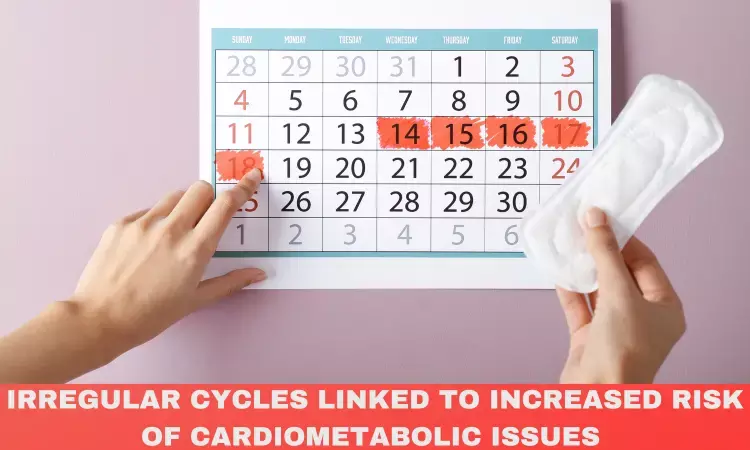- Home
- Medical news & Guidelines
- Anesthesiology
- Cardiology and CTVS
- Critical Care
- Dentistry
- Dermatology
- Diabetes and Endocrinology
- ENT
- Gastroenterology
- Medicine
- Nephrology
- Neurology
- Obstretics-Gynaecology
- Oncology
- Ophthalmology
- Orthopaedics
- Pediatrics-Neonatology
- Psychiatry
- Pulmonology
- Radiology
- Surgery
- Urology
- Laboratory Medicine
- Diet
- Nursing
- Paramedical
- Physiotherapy
- Health news
- Fact Check
- Bone Health Fact Check
- Brain Health Fact Check
- Cancer Related Fact Check
- Child Care Fact Check
- Dental and oral health fact check
- Diabetes and metabolic health fact check
- Diet and Nutrition Fact Check
- Eye and ENT Care Fact Check
- Fitness fact check
- Gut health fact check
- Heart health fact check
- Kidney health fact check
- Medical education fact check
- Men's health fact check
- Respiratory fact check
- Skin and hair care fact check
- Vaccine and Immunization fact check
- Women's health fact check
- AYUSH
- State News
- Andaman and Nicobar Islands
- Andhra Pradesh
- Arunachal Pradesh
- Assam
- Bihar
- Chandigarh
- Chattisgarh
- Dadra and Nagar Haveli
- Daman and Diu
- Delhi
- Goa
- Gujarat
- Haryana
- Himachal Pradesh
- Jammu & Kashmir
- Jharkhand
- Karnataka
- Kerala
- Ladakh
- Lakshadweep
- Madhya Pradesh
- Maharashtra
- Manipur
- Meghalaya
- Mizoram
- Nagaland
- Odisha
- Puducherry
- Punjab
- Rajasthan
- Sikkim
- Tamil Nadu
- Telangana
- Tripura
- Uttar Pradesh
- Uttrakhand
- West Bengal
- Medical Education
- Industry
Menstrual history may hold the key to women's heart health: BMC Medicine

UK: A new study published in BMC Medicine has found that menstrual cycle characteristics could be an important factor in predicting cardiovascular disease (CVD) risk in women.
The study, conducted by researchers in the UK and using data from The Health Improvement Network, found that women with a history of irregular or infrequent menstrual cycles were at higher risk for a range of cardiometabolic outcomes, including ischemic heart disease, cerebrovascular disease, heart failure, hypertension, and type 2 diabetes mellitus.
Over a 26-year period, the retrospective cohort study followed over 704,743 women aged 18-40. Over 252,325 of these women had a history of irregular menstruation and were matched with up to two controls. The regularity and frequency of menstrual cycles were investigated.
The primary outcome was composite cardiovascular disease, and secondary outcomes included ischemic heart disease, cerebrovascular disease, heart failure, hypertension, and type 2 diabetes mellitus.
The study found the following clinical findings:
- The study found that compared to women with regular menstrual cycles, those with irregular cycles had higher adjusted hazard ratios for all cardiometabolic outcomes except cerebrovascular disease.
- The hazard ratios were even higher for women with infrequent or frequent menstrual cycles than those with normal frequency cycles.
- Menstrual history could be useful in identifying women at increased risk of cardiometabolic outcomes in later life.
The findings of this study are important because they highlight the need for better recognition of menstrual cycle characteristics as a factor associated with cardiovascular disease risk.
“Women with irregular or infrequent menstrual cycles may benefit from more frequent evaluation of their cardiometabolic health, which may aid in preventing or managing future disease. As such, "this study adds to the growing body of evidence that supports a more personalized approach to cardiovascular disease prevention and management in women.” the researchers added.
Reference:
Okoth, K., Smith, W.P., Thomas, G.N. et al. The association between menstrual cycle characteristics and cardiometabolic outcomes in later life: a retrospective matched cohort study of 704,743 women from the UK. BMC Med 21, 104 (2023).
https://doi.org/10.1186/s12916-023-02794-x
Dr. Mahalakshmi Sivashankaran joined Medical Dialogues as an Intern in 2023. She is a BDS graduate from Manipal College of Dental Sciences, Mangalore Batch 2022, and worked as a Junior Resident at VMMC & Safdarjung Hospital at the Department of Dental Surgery till January 2023. She has completed a Diploma in Executive Healthcare management from the Loyola Institute of Business Administration, developing skills in Healthcare Management and Administration. She covers several medical specialties including Dental, ENT, Diagnostics, Pharmacology, Neurology, and Cardiology.
Dr Kamal Kant Kohli-MBBS, DTCD- a chest specialist with more than 30 years of practice and a flair for writing clinical articles, Dr Kamal Kant Kohli joined Medical Dialogues as a Chief Editor of Medical News. Besides writing articles, as an editor, he proofreads and verifies all the medical content published on Medical Dialogues including those coming from journals, studies,medical conferences,guidelines etc. Email: drkohli@medicaldialogues.in. Contact no. 011-43720751


